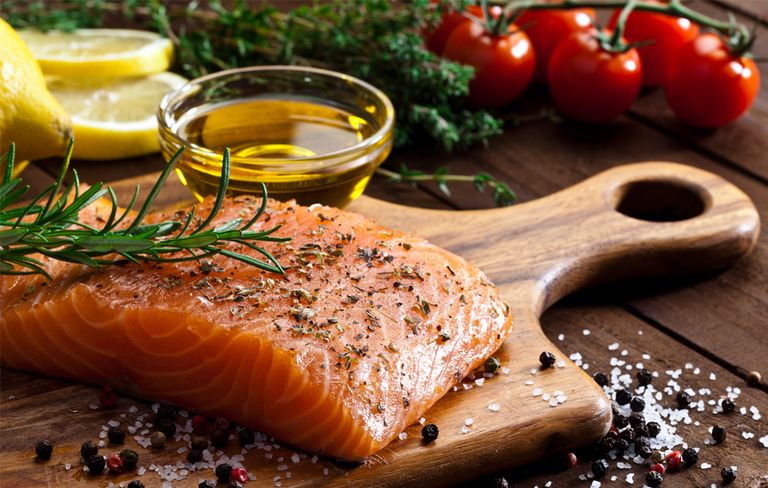
It’s been said that the Mediterranean Diet, which focuses on plant-based foods and lean proteins like fish and chicken, can help you lose weight and slash your cancer risk. But is the Mediterranean Diet really worth the hype?
Last June, many asked themselves that question when the New England Journal of Medicine retracted a major 2013 study that claimed the Mediterranean diet reduced your risk of heart attack and stroke. Because the 2013 research did not meet the standards of a randomized, control trial, there wasn’t enough evidence to support the study, the retraction stated.
At the end of the day, however, Sean Heffron, MD, preventive cardiologist at NYU Langone Health, says the Mediterranean Diet is still the healthiest way to eat.
Wanna try the Mediterranean Diet? Here’s what you need to know.
What to eat on the Mediterranean Diet
Getty
The Mediterranean Diet emphasizes heart-healthy foods like nuts, fish, and olive oil, and limits intake of red meat, butter, and added sugar. For this reason, it might be difficult to adapt the Mediterranean diet if you typically subsist on Seamless or frozen dinners.
But Heffron says that “any shift away from a nutrient-poor, refined-food heavy diet toward a Mediterranean-type diet is likely to be beneficial.” You can start small by increasing your veggie intake or switching from refined grains to whole grains.
Here’s a look at the most common Mediterranean Diet staples, according to the Mediterranean Diet pyramid.
Grains: One to two servings of whole grain bread, pasta, rice and couscous are eaten at every meal.
Vegetables: Include two servings of vegetables in a variety of colors at both lunch and dinner. (For reference, one serving is roughly a half cup of cooked veggies, or one cup of raw veggies.) Traditional Mediterranean choices include kale, eggplant, artichoke, beets and sweet potatoes.
Fruit: Fruit is eaten as a dessert, with one to two servings recommended after lunch and dinner. Opt for fruits like apples, apricots, dates, figs and pomegranates, which are common in the Mediterranean region.
Fats: Instead of eating chips or processed snacks, get your fats from heart-healthy sources like olive oil and nuts. Limit your olive oil intake to between one and four tablespoons a day. (That includes oil used for cooking.)
Meat: You should be getting your protein from omega-3-rich sources like salmon, tuna mackerel, and anchovies. Limit your red meat intake to only a few times per month.
Dairy: Under the Mediterranean Diet, you can eat three servings of low-fat yogurt, cheese, or milk per week.
What are the benefits of the Mediterranean Diet?
MaryDawn Wright/Sabra
1) Your heart health improves.
Time and time again, studies show that the Mediterranean diet protects your heart. That’s an important perk, since heart disease is the leading killer of men in the United States, according to the Centers for Disease Control and Prevention (CDC).
One preliminary study from the American College of Cardiology sheds light on that statistic even further: After following more than 2,500 Greek adults aged 18 to 89 for 11 years, researchers found that nearly 20 percent of men who participated in the study either developed or died from heart disease.
Plus, the diet emphasizes canola oil, walnuts, and fatty fish, all of which contain omega-3 fatty acids, a type of fat that can help lower your triglycerides (a type of fat in your blood), keep your blood pressure stable and your blood vessels healthy, all of which benefit your heart in the long run, according to the Mayo Clinic.
2) Your penis performs better.
Erectile dysfunction (ED) is a common symptom of heart disease, because once plaque starts to form and build up in your blood vessels, the super small blood vessels in your penis are some of the first to get blocked up, says Jamin Brahmbhatt, M.D., a urologist at Orlando Health.
Research supports this idea: In one study, Italian scientists asked 35 men diagnosed with ED and metabolic syndrome—a term used to describe a cluster of risk factors associated with heart problems—to eat lots of Mediterranean staples, like fruits, vegetables, whole grains, olive oil, and fish. Another 30 men with just metabolic syndrome followed a control diet instead.
After two years, one third of men who ate the Mediterranean diet regained normal sexual functioning, the study found. The researchers aren’t sure why this is, but they hypothesized that foods full of fiber and antioxidants work to reduce inflammation in your body, which helps promote healthy blood flow, the study authors say.
Getty
3) Your brain ages slower.
Brain food is a real thing, according to a review published in the journal Frontiers in Nutrition. Australian researchers looked at 18 different studies examining the Mediterranean diet’s impact on brain functioning and found that people who stuck to the diet experienced slower rates of age-related cognitive decline and had a lower risk of developing Alzheimer’s disease. In fact, eating Mediterranean foods was associated with better working memory and attention.
Many Mediterranean diet foods reduce inflammation in your body, and scientists believe this protects nerve cells in your brain from deteriorating, research from Spain suggests.
4) Your vision can improve.
Antioxidants in Mediterranean-approved foods like dark leafy greens, oranges, peppers, and sweet potatoes are great for your vision, according to the American Academy of Ophthalmology.
Plus, people who eat just one serving of fish per week have a 31% lower risk of developing early age-related macular degeneration (AMD), a type of eye damage that’s the leading cause of vision loss for people 50 and older, a study published in JAMA Ophthalmology suggests.
The reason? Eating more omega-3 fatty acids, which are found in both fish and nuts, may protect your retinas from cell damage.
5) Your colon cancer risk drops.
Colorectal cancer is the second leading cause of cancer death in men in the United States, according to the American Cancer Society. But eating certain foods may reduce your odds of developing the disease in the first place, according to preliminary research from the European Society for Medical Oncology.
After surveying 800 people being screened for the disease or undergoing colonoscopies, scientists found that those with advanced colon polyps — a clump of precancerous cells that form on the lining of your colon or rectum — reported eating fewer Mediterranean diet foods and more red meat.
In fact, eating at least 90 grams of whole grains per day can slash your colon cancer risk by 17 percent, according to a report from the World Cancer Research Fund and the American Institute for Cancer Research. The reason: fiber in whole grains keep you regular, which may minimize the chances of developing cancer-causing mutations in your digestive tract, the report authors note.
That said, your diet can only take you so far. Colonoscopies can save your life, so the best way to catch colon cancer early is by getting screened for it regularly.
6) Your kidney function improves.
Your kidneys don’t get enough credit: they’re constantly working to filter out extra water and waste from your blood, while producing hormones that keep your blood pressure in check and your bones strong.
Yet chronic kidney disease, or long-term kidney damage, affects more than 30 million Americans.
The good news is that those who closely followed the Mediterranean diet reduced their risk of developing chronic kidney disease by 50%, according to a study of 900 people in the Clinical Journal of the American Society of Nephrology. This may be because fruits, vegetables, nuts, olive oil and fish have been proven to lower inflammation in your body, a known contributor to chronic kidney disease.
7) You could lose weight.
Most doctors tout the importance of eating fruits and vegetables, so it’s no surprise that the Mediterranean diet can help you drop a few pounds. A study of more than 7,000 adults published in The Lancet found that people lost more weight on the Mediterranean diet without counting calories compared to those on lower fat diets.
The Mediterranean is particularly effective at reducing belly fat, which is more harmful to overall health and raises your heart disease and type 2 diabetes risk.
Source: Read Full Article


